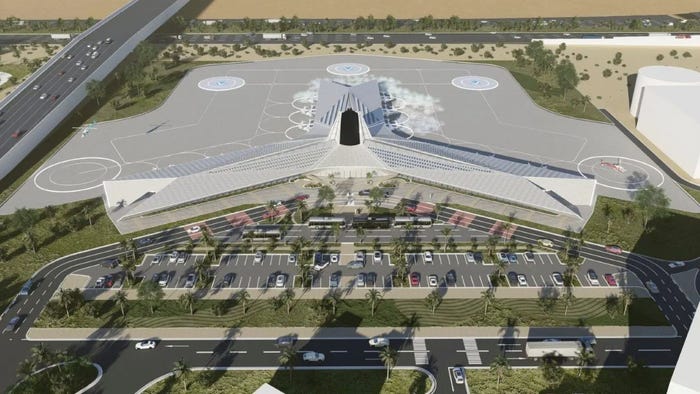Flying Taxi Company Expanding; $20M Grant from New YorkFlying Taxi Company Expanding; $20M Grant from New York
The new facility is intended to become the manufacturing and final assembly hub for Beta’s electric aerial vehicles

An air taxi developer has been granted $20 million from the state of New York to expand its operations at Plattsburgh International Airport.
Beta Technologies in Burlington, Vermont, was awarded the grant via Clinton County from Empire State Development’s Regional Economic and Community Assistance Program.
As part of the deal, Beta agreed to create 85 full-time jobs.
The new facility is intended to become the manufacturing and final assembly hub for Beta’s electric aerial vehicles (EAV) and to create a permanent flight test and EAV delivery center, for final flight testing, vehicle painting and customer delivery.
Beta’s test flight center at Plattsburgh has been the starting point of most of its innovative technology.
Many of Beta’s flight milestones were completed in New York State.
“If you're looking for the jobs of the future, come to New York,” said Governor Kathy Hochul. “This expansion of Beta Technologies in Plattsburgh is exactly the kind of growth and innovation that's supercharging New York's economy for the 21st Century”
Beta has orders for its flying vehicles from UPS, United Therapeutics, Bristow, LCI, Blade and Helijet, and has contracts with the U.S. Air Force and Army.
New York State has been investing in building clean transportation infrastructure in the state, including investing more than $2.7 billion for clean transportation initiatives.
“New York State has a strong workforce and a track record of leadership when it comes to supporting and enabling next-generation transportation,” said Beta founder and CEO Kyle Clark. “At Beta, we’re focused on making aviation cleaner and more efficient for the future, and that requires a number of pieces including technology, infrastructure and a capable workforce. We’ve been developing, flying and maintaining our electric aircraft at Plattsburgh International Airport since 2017, and in that time, we’ve been overwhelmed by the state and county's support of our vision.”
Beta recently was approved for a $169 million loan to finance its net-zero final assembly production facility from the Export-Import Bank of the United States (EXIM).
That was part of EXIM’s Make More in America initiative, estimated to support 400 clean energy jobs in Vermont.
Beta recently opened its manufacturing facility in Vermont for the large-scale production of its electric aircraft.
The 188,500 square-foot facility is located at the Patrick Leahy Burlington International Airport, where Beta plans to build its eVTOL (electric vertical takeoff and landing) and CTOL (conventional takeoff and landing) aircraft.
Beta’s Alia vertical and conventional takeoff vehicles are targeted for military and commercial use, including for medical, defense and passenger industries.
Beta has been working on developing its electric aerial vehicles with numerous aerospace suppliers including Albany Engineered Composites, Advanced Integration Technology, Garmin, Sensata Technologies, Volz Servis and Solvay.
The new production facility, on a 40-acre site at the airport, could ultimately produce 300 EAVs a year, according to the company.
The company also has locations in Plattsburgh, New York, Washington, D.C., Montreal, Canada, Raleigh, North Carolina and Springfield, Ohio.
Beta has partnered with AFWERX, the innovation arm of the U.S. Air Force that leverages the Air Force Research Laboratory for this program.
Beta also recently installed aircraft electric charging stations at Eglin Air Force Base to service the electric flying vehicles there.
Beta’s eCTOL aircraft is planned for service in 2025 with its vertical version in service the following year.
Many EAVs are eVTOLs, which do not require traditional runways, since they take off and land straight up and down.
Vertiport facilities to manage the takeoff, landing, charging and maintenance of such vehicles are being established by companies including Volatus Infrastructure and Aeroauto Vertiport Development, which has retail showrooms for flying vehicle sales in Florida.
A Department of Defense (DoD) research center partnered with Beta starting in 2020 to develop electric aviation in the U.S. military market. Beta received an airworthiness certificate for manned flight from the military, with military test pilots flying the vehicles.
The Beta electric charger can charge an electric aircraft in less than an hour, according to the company.
Like what you've read? For more stories like this on flying cars and other emerging technologies, sign up for our free daily email newsletter to stay updated!
Read more about:
Flying CarsAbout the Author
You May Also Like






